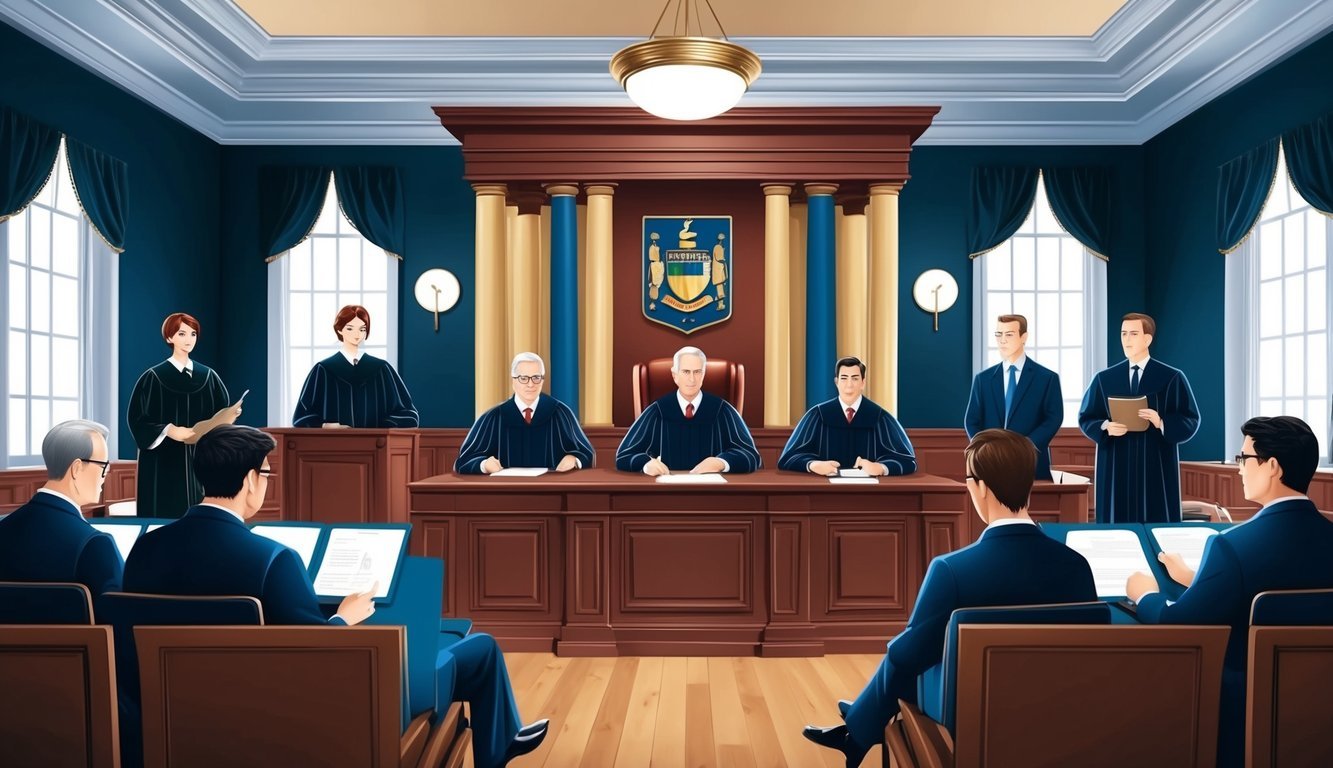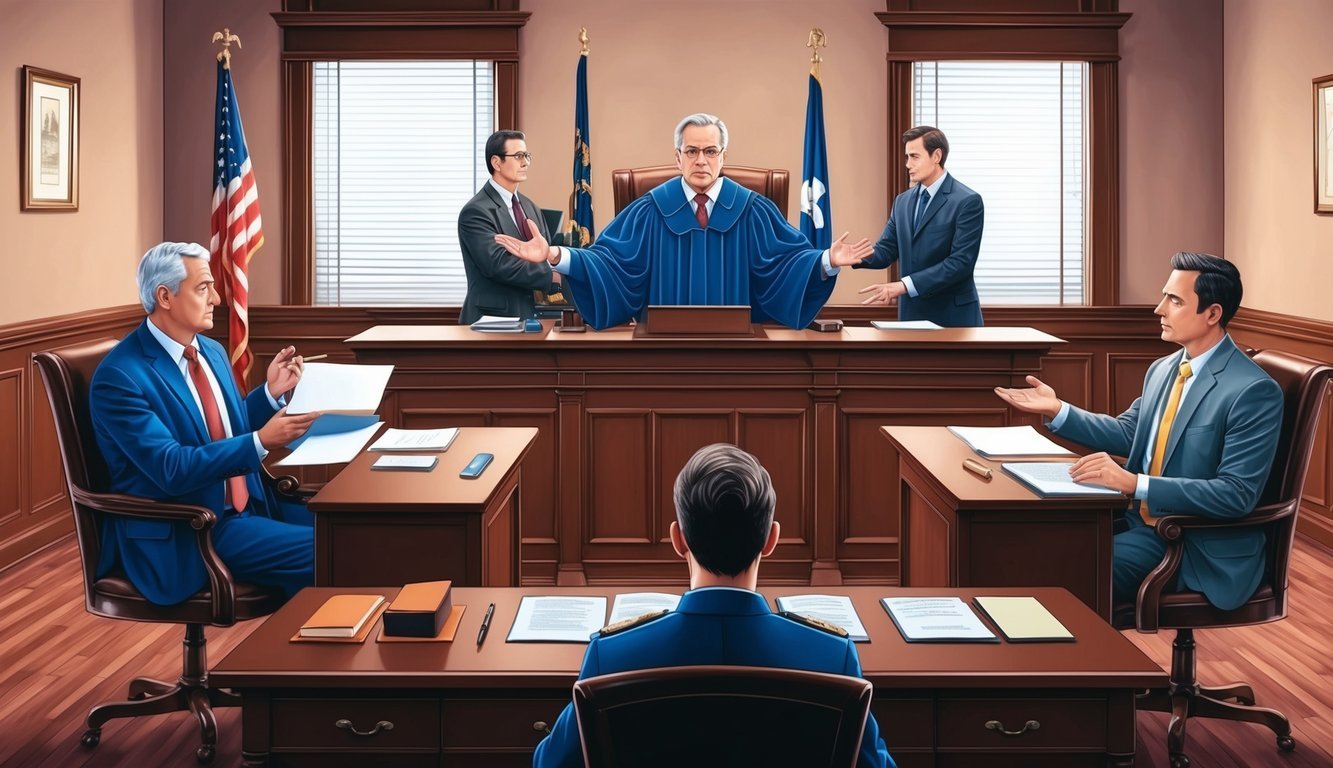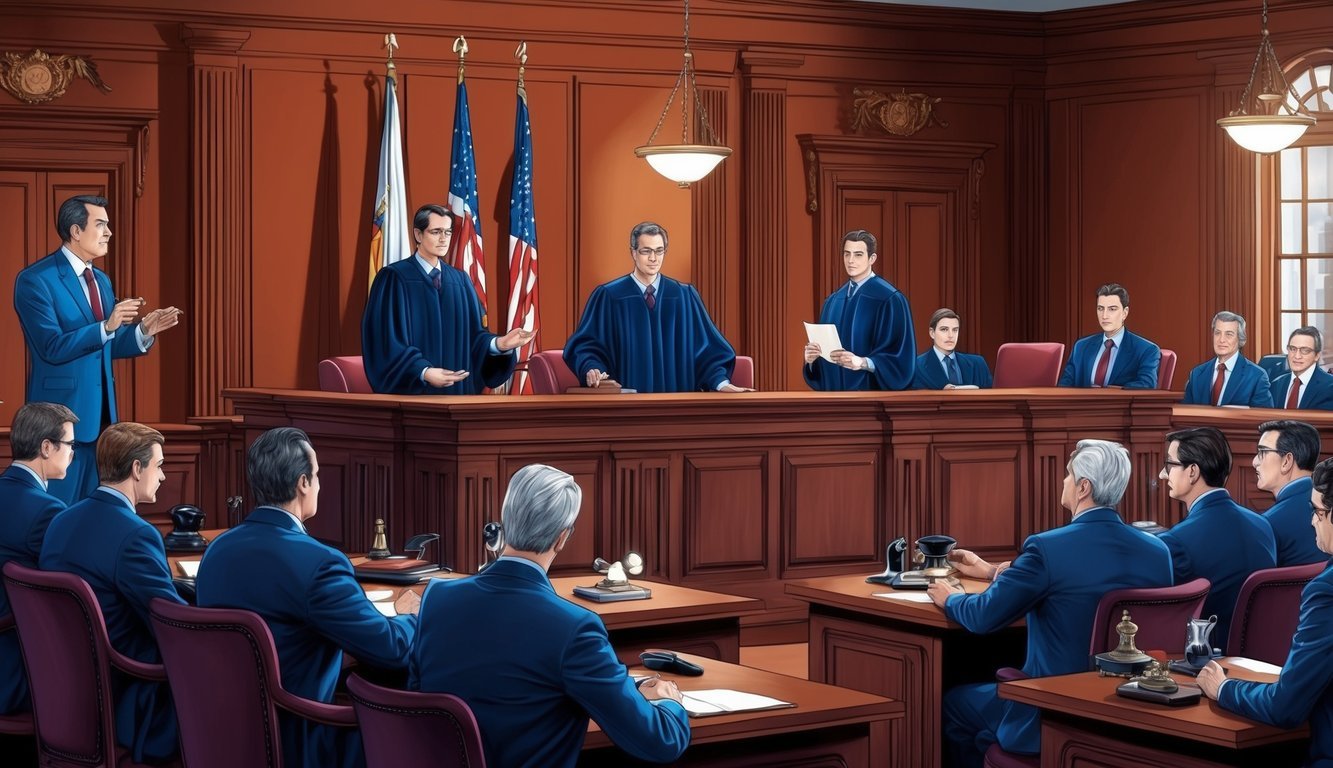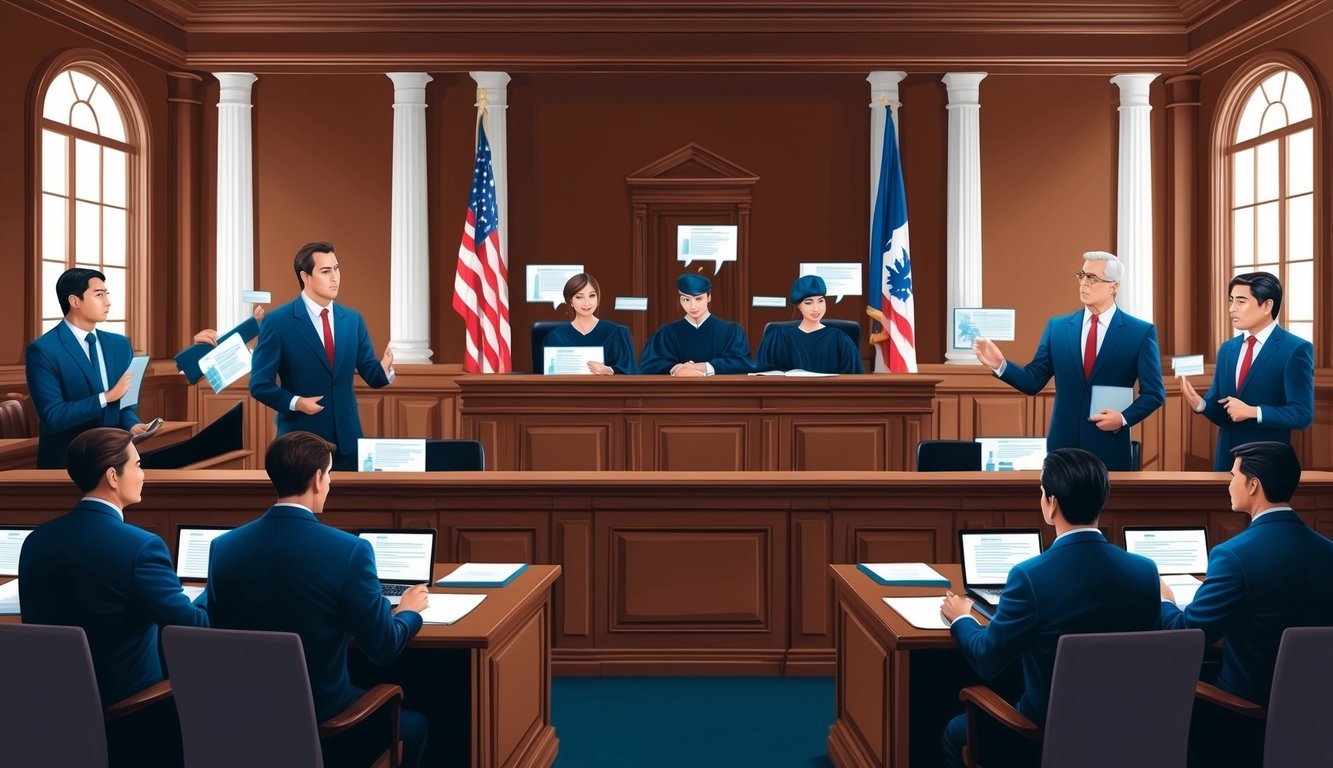Intellectual property litigation plays a crucial role in protecting innovations and creative works in today’s fast-paced business world. As companies strive to safeguard their unique ideas and inventions, legal disputes over patents, trademarks, and copyrights have become increasingly common.
Businesses and individuals seeking to defend their intellectual assets and navigate the complex legal landscape must understand the intricacies of IP litigation.
IP litigation encompasses a wide range of legal actions, from patent infringement cases to trademark disputes and copyright violations. These battles often involve high stakes, with outcomes that can significantly impact a company’s market position and financial health.
The rise of digital technologies and global commerce has further complicated the field, introducing new challenges and opportunities for intellectual property protection.
Navigating IP litigation requires specialized knowledge and expertise. Attorneys in this field must stay abreast of rapidly evolving laws and precedents while developing strategies to protect their clients’ interests.
As the importance of intellectual property continues to grow, so does the need for effective litigation strategies and a thorough understanding of the legal processes involved.
Key Takeaways
- IP litigation is crucial for protecting innovations and creative works in the modern business landscape.
- The field encompasses various legal actions, including patent infringement, trademark disputes, and copyright violations.
- Specialized knowledge and expertise are essential for successfully navigating the complex world of IP litigation.
Understanding Intellectual Property
Intellectual property (IP) forms the cornerstone of innovation and creativity in business. It encompasses various forms of legal protection for intangible assets that can provide significant competitive advantages.
Types of Intellectual Property
Trademarks safeguard your brand identity, including logos, slogans, and product names. Patents protect novel inventions and technological advancements, giving you exclusive rights for a specified period. Copyrights cover original artistic and literary works, including software code and marketing materials.
Trade secrets involve confidential business information that gives you an edge over competitors. This might include formulas, manufacturing processes, or customer lists. Unlike other IP types, trade secrets don’t require registration but must be kept strictly confidential.
Each type of IP serves a unique purpose in protecting your business assets. You should carefully consider which forms of protection best suit your needs and strategic goals.
Significance of Intellectual Property in Business
IP plays a crucial role in your business success. It allows you to monetize your innovations and creative works, generating revenue through licensing or direct sales.
By securing IP rights, you create barriers to entry for competitors, maintaining your market position.
Strong IP portfolios can attract investors and increase your company’s valuation. They demonstrate your commitment to innovation and long-term growth potential. IP assets can also be used as collateral for loans, opening up new financing opportunities.
In the global marketplace, IP rights enable you to expand into new markets while protecting your products from unauthorized copying. This international protection is especially vital for businesses operating across borders.
The Landscape of IP Litigation

Intellectual property litigation encompasses complex legal battles over patents, trademarks, copyrights, and trade secrets. The landscape is diverse, with each area presenting unique challenges and trends for businesses and individuals.
Prevalence of Patent Litigation
Patent litigation remains a dominant force in the IP landscape. You’ll find that patent disputes often center on technology and pharmaceutical sectors. Large corporations frequently engage in high-stakes battles over patent infringement claims.
The rise of Inter Partes Reviews (IPRs) has added complexity to patent litigation. You may notice challengers strategically timing their IPR filings to influence district court proceedings. This tactic can significantly impact the outcome of patent disputes.
Patent trolls, entities that acquire patents solely for litigation purposes, continue to shape the landscape. You should be aware that their activities can affect businesses of all sizes.
Trademark Infringement and Litigation
Trademark litigation focuses on protecting brand identities and consumer recognition. You’ll observe an increase in cases involving e-commerce and social media platforms.
Counterfeit goods remain a significant concern, especially in luxury markets. Your brand may face challenges from overseas manufacturers producing knockoff products.
Trademark disputes often arise in emerging industries, such as cannabis and cryptocurrency. You should stay vigilant about protecting your marks in these rapidly evolving sectors.
Copyright and Trade Secret Disputes
Copyright litigation frequently involves digital content, software, and entertainment industries. You may encounter cases related to unauthorized use of images, music, or written works online.
The music industry faces ongoing challenges with streaming platforms and sampling disputes. Your creative works require careful protection in the digital age.
Trade secret litigation has gained prominence, particularly in tech and manufacturing sectors. You should be aware of the increasing importance of managing IP globally, as trade secret theft often crosses international borders.
Cybersecurity breaches leading to trade secret misappropriation are on the rise. Your company’s confidential information needs robust protection measures to prevent costly litigation.
Patent Law and Administration
Patent law governs the protection of inventions and designs through legal rights granted by governments. The administration of these laws involves complex processes and specialized bodies to enforce and adjudicate patent-related matters.
Understanding Patent Trials
Patent trials occur when disputes arise over patent infringement or validity. You may encounter these legal proceedings in federal courts, where judges and juries determine if a patent has been violated or if it should be upheld.
Patent litigation can be lengthy and costly, often involving technical experts and extensive evidence presentation. During a trial, you’ll see arguments about claim interpretation, prior art, and the scope of the patent.
Key stages of a patent trial include:
- Discovery
- Markman hearings
- Presentation of evidence
- Expert testimony
- Jury deliberation (if applicable)
Role of the Patent Trial and Appeal Board
The Patent Trial and Appeal Board (PTAB) plays a crucial role in the U.S. patent system. You’ll find this administrative body within the United States Patent and Trademark Office (USPTO).
The PTAB conducts various proceedings, including:
- Inter partes review
- Post-grant review
- Covered business method review
These proceedings offer alternative routes to challenge patent validity outside of federal courts. You can expect shorter timelines and specialized expertise in these administrative trials.
PTAB decisions can significantly impact patent rights and the overall landscape of intellectual property protection. The board’s rulings may be appealed to the Federal Circuit Court of Appeals.
Section 337 Investigations by the U.S. International Trade Commission
Section 337 investigations provide a unique avenue for addressing unfair import practices, including those involving patent infringement. The U.S. International Trade Commission (ITC) conducts these investigations.
Key aspects of Section 337 investigations include:
- Focus on imported goods
- Faster timeline compared to district court litigation
- Potential for exclusion orders barring importation
You’ll find these proceedings particularly relevant if you’re dealing with cross-border patent disputes. The ITC can issue powerful remedies, such as cease and desist orders, which can significantly impact international trade.
Legal Institutions Governing IP

Specialized courts and administrative bodies play crucial roles in resolving intellectual property disputes. These institutions have developed expertise in handling complex IP cases and shaping IP law.
Federal Circuit
The Court of Appeals for the Federal Circuit has exclusive jurisdiction over patent appeals. You’ll find this court’s decisions carry significant weight in patent law. The Federal Circuit aims to provide uniformity in patent rulings across the country.
Key responsibilities include:
- Reviewing district court patent decisions
- Hearing appeals from the Patent Trial and Appeal Board
- Interpreting patent statutes and doctrines
The court’s specialized focus allows it to develop deep expertise in patent law intricacies. This expertise helps refine and clarify patent rights for inventors and businesses.
International Trade Commission (ITC)
The ITC offers a unique forum for IP disputes involving imported goods. You can bring cases here to block infringing imports at the border. ITC proceedings tend to move faster than district court litigation.
ITC investigations cover:
- Patent infringement
- Trademark violations
- Copyright infringement
- Trade secret misappropriation
The ITC can issue exclusion orders to prevent infringing products from entering the U.S. This power makes it an attractive venue for companies facing foreign competition.
Role of District Courts in IP
Federal district courts handle the majority of IP litigation in the U.S. You’ll encounter a wide range of IP cases here, from patent infringement to trademark disputes. These courts apply both federal and state IP laws.
District courts offer several advantages:
- Broad jurisdiction over various IP matters
- Ability to award monetary damages
- Option for jury trials in many cases
Judges in some districts have developed significant IP expertise due to high caseloads. You may find certain venues particularly attractive for your IP disputes based on their experience and reputation.
Protection of Trade Secrets and Unfair Competition

Trade secrets and unfair competition laws safeguard businesses from unauthorized use of proprietary information and deceptive practices. These protections are crucial for maintaining a fair marketplace and preserving intellectual property rights.
Handling Trade Secret Misappropriation
When faced with trade secret misappropriation, you must act swiftly to protect your valuable information. Intellectual property laws provide a framework for safeguarding your trade secrets.
First, identify the scope of the breach and gather evidence of unauthorized access or use. Then, consider implementing the following steps:
- Conduct an internal investigation
- Secure remaining trade secrets
- Notify relevant parties
- Consult with legal counsel
You may need to file for injunctive relief to prevent further dissemination of your trade secrets. Unfair competition laws can offer additional protection against misappropriation.
Document all damages incurred to support potential claims for monetary compensation.
Addressing Unfair Competition Claims
Unfair competition encompasses a range of deceptive or unethical business practices. You must be vigilant in identifying and addressing such claims to maintain your market position.
Common forms of unfair competition include:
- False advertising
- Trademark infringement
- Trade dress violations
- Misappropriation of trade secrets
When confronting unfair competition, gather evidence of the offending party’s actions and their impact on your business. Then, consult with legal experts to determine the most appropriate course of action, which may include cease and desist letters, negotiations, or litigation.
Trade secret protection often intersects with unfair competition claims. You should review your internal policies to ensure proper safeguards are in place.
This may include:
- Implementing robust non-disclosure agreements
- Limiting access to sensitive information
- Regularly updating security protocols
Industries Affected by IP Litigation

Various sectors are affected by intellectual property litigation, with technology and pharmaceuticals being particularly vulnerable. These industries rely heavily on innovation and face unique challenges in protecting their intellectual assets.
Technology and Software
The technology and software sector is frequently embroiled in IP disputes. You’ll find that patent infringement cases are common, especially in areas like smartphone technology and software algorithms. Companies invest heavily in research and development, making IP protection crucial for their success.
Large tech firms often engage in litigation to defend their market position. Meanwhile, small startups may struggle to protect their innovations due to limited resources. Patent trolls pose a significant threat, targeting companies with broad patent claims.
The fast-paced nature of technological advancement complicates IP issues. Software patents, in particular, are contentious due to debates over what constitutes a patentable invention in this field.
Pharmaceuticals and Biotechnology
IP protection is vital in the pharmaceutical and biotechnology industries. You’ll notice that these sectors invest billions in developing new drugs and therapies. Patent litigation is common, as companies seek to protect their exclusive rights to manufacture and sell their products.
Generic drug manufacturers often challenge patents to bring lower-cost alternatives to market. This leads to complex legal battles over patent validity and infringement.
Biotechnology firms face unique challenges in IP litigation. The patentability of genetic material and research tools is a contentious issue. Patent thickets can impede innovation, as multiple patents may cover a single product or process.
Trade secrets play a crucial role in these industries. Litigation often arises from alleged misappropriation of confidential information by former employees or competitors.
Influential Litigation Cases and Precedents

Landmark decisions from the Supreme Court and Federal Circuit have shaped intellectual property law. These rulings have established crucial precedents in patent and trademark cases, defining the boundaries of protection for innovations and brands.
Major Supreme Court Decisions
The Supreme Court has issued several groundbreaking rulings in intellectual property litigation. In Alice Corp. v. CLS Bank International, the Court set a new standard for patent eligibility of software and business methods. This decision has significantly impacted how you approach patent applications in these fields.
Another pivotal case, TC Heartland v. Kraft Foods, redefined venue rules for patent infringement lawsuits. As a result, you’ll find that patent litigation is now more concentrated in specific jurisdictions.
In trademark law, Matal v. Tam struck down the Lanham Act’s disparagement clause, expanding protection for potentially offensive marks. This ruling has broadened your options when selecting and registering trademarks.
Notable Federal Circuit Outcomes
The Federal Circuit, specializing in patent cases, has issued influential decisions that guide your intellectual property strategy. In Berkheimer v. HP Inc., the court clarified the role of factual evidence in determining patent eligibility under Alice. This ruling has given you more opportunities to defend patent validity.
For design patents, Apple v. Samsung set a precedent for calculating damages based on the “article of manufacture.” This decision impacts how you assess potential awards in design patent infringement cases.
The Federal Circuit has also addressed trademark issues. In In re Brunetti, the court found the Lanham Act’s immoral or scandalous marks provision unconstitutional, further expanding your trademark registration options.
Intellectual Property in Diverse Fields

Intellectual property rights play a crucial role across various industries, protecting innovations and creative works. The entertainment sector and consumer product manufacturing face unique challenges in safeguarding their intellectual assets.
IP Challenges in the Entertainment Industry
In the entertainment world, you’ll encounter complex IP issues. Copyright protections are vital for films, music, and literary works. Trademark rights safeguard brand names and logos of studios, production companies, and franchises.
Licensing agreements are common, allowing for merchandise creation and distribution rights. You may face challenges with fair use claims when incorporating existing works into new productions. Digital piracy remains a significant concern, requiring robust enforcement strategies.
Celebrity image rights and personality rights add another layer of complexity. You must navigate these carefully when using likenesses in various media. The global nature of entertainment distribution also necessitates understanding international IP laws and treaty obligations.
Consumer Products and Manufacturing
In consumer products and manufacturing, you’ll find a wide array of IP considerations. Patents are crucial for protecting new inventions and technological advancements in your products. You may use utility patents for functional aspects and design patents for unique aesthetic features.
Trade secrets can safeguard your manufacturing processes and formulas. This is especially important for companies producing organic beauty products with proprietary ingredients. You’ll need to implement strict confidentiality measures to maintain these secrets.
Trademarks are essential for building brand recognition and distinguishing your products in the marketplace. You should consider both word marks and logo designs to protect your brand identity comprehensively.
In telecommunications, you’ll encounter patents related to networking technologies and communication protocols. Your IP strategy may involve cross-licensing agreements with other industry players to ensure interoperability of devices and systems.
Alternate Dispute Resolution in IP

Intellectual property disputes can be resolved through alternative methods that offer efficiency and flexibility. These approaches provide specialized forums for addressing complex IP issues outside of traditional courtrooms.
Arbitration in IP Conflicts
Arbitration offers a private, tailored approach to resolving IP disputes. You can select arbitrators with expertise in your specific IP field, ensuring a nuanced understanding of technical issues. This process is often faster and more cost-effective than litigation.
Voluntary arbitration of patent disputes is permitted in many jurisdictions, allowing for customized resolution strategies. You’ll find that arbitration can be particularly beneficial for cross-border IP conflicts, as it provides a neutral forum and potentially enforceable awards internationally.
Key advantages of arbitration in IP cases include:
- Confidentiality protection
- Flexible procedures
- Potentially lower costs
- Faster resolution times
Post-Grant Proceedings and Inter Partes Review
Post-grant proceedings offer you an administrative alternative to challenge patent validity. Inter Partes Review (IPR) is a popular option, allowing you to contest issued patents based on prior art.
These proceedings take place before the Patent Trial and Appeal Board, providing a specialized venue for patent disputes. You’ll find that IPRs are generally faster and less expensive than federal court litigation.
Benefits of post-grant proceedings include:
- Expert administrative judges
- Streamlined discovery processes
- Shorter timelines compared to litigation
IPRs can address the entire spectrum of intellectual property issues, offering you a focused approach to patent challenges. This process allows for a thorough examination of patent validity without the full complexity of a court trial.
Awards, Recognitions, and Ranking in IP Law

IP law firms and practitioners strive for excellence in their field. Recognition through prestigious awards and rankings validates their expertise and dedication to protecting intellectual property rights.
LMG Life Sciences Awards
The LMG Life Sciences Awards celebrate outstanding achievements in intellectual property law related to the life sciences industry. These awards recognize law firms and individual attorneys who have demonstrated exceptional skill in patent litigation, licensing, and regulatory matters.
Top firms often receive accolades for their work in areas such as Hatch-Waxman patent litigation and biosimilar disputes. Individual practitioners may be honored for their contributions to landmark cases or innovative legal strategies.
The awards ceremony provides a platform for networking and knowledge sharing among industry leaders. It showcases the dynamic nature of IP law in the ever-evolving life sciences sector.
Chambers USA and Chambers US
Chambers USA and Chambers US are highly regarded ranking systems that evaluate law firms and individual attorneys based on their expertise and client service. These rankings are particularly valuable in the field of intellectual property law.
Chambers employs a rigorous research process, including in-depth interviews with clients and peers. IP lawyers are ranked in various categories, such as patent prosecution, trademark law, and copyright litigation.
Top-ranked firms often demonstrate a track record of success in high-stakes IP disputes and complex transactions. Individual attorneys may be recognized for their innovative approaches to protecting and monetizing intellectual property assets.
These rankings serve as a valuable resource for clients seeking expert legal counsel in IP matters. They provide insights into the strengths and specializations of different firms and practitioners in the field.
Frequently Asked Questions

Intellectual property litigation involves complex legal processes and potential consequences. Understanding key aspects can help navigate these challenges effectively.
What are the common grounds for intellectual property lawsuits?
Common grounds for intellectual property lawsuits include patent infringement, copyright violations, and trademark misuse. You may encounter disputes over trade secrets or design rights as well.
These cases often arise when one party believes another has used their protected intellectual property without permission or proper compensation.
What constitutes infringement of intellectual property rights?
Infringement occurs when someone uses, reproduces, or exploits protected intellectual property without authorization. This can include copying patented inventions, reproducing copyrighted works, or using trademarks in ways that cause confusion.
You should be aware that even unintentional use of protected material can sometimes constitute infringement.
How is intellectual property litigation conducted?
Intellectual property litigation typically begins with filing a complaint in court. The process involves discovery, where parties exchange information, and may include depositions where witnesses answer questions under oath.
You can expect expert witnesses to play a crucial role in these cases, providing specialized knowledge about the intellectual property in question.
What are the potential remedies for a successful intellectual property litigation?
If you prevail in an intellectual property lawsuit, remedies may include monetary damages to compensate for losses. Courts can also issue injunctions to stop infringing activities.
In some cases, you might be awarded additional damages if the infringement was willful or egregious.
What is the role of an intellectual property lawyer in litigation?
An intellectual property lawyer guides you through the legal process, developing case strategies and representing your interests in court. They analyze complex technical and legal issues related to your intellectual property. Your lawyer will also handle negotiations, draft legal documents, and present arguments on your behalf during the litigation.
How does intellectual property prosecution differ from litigation?
Intellectual property prosecution involves obtaining and maintaining intellectual property rights. This includes actions like filing patent applications or registering trademarks. Meanwhile, litigation focuses on enforcing those rights or defending against infringement claims.
Prosecution is primarily an administrative process. On the other hand, litigation takes place in court and can be more adversarial in nature.

